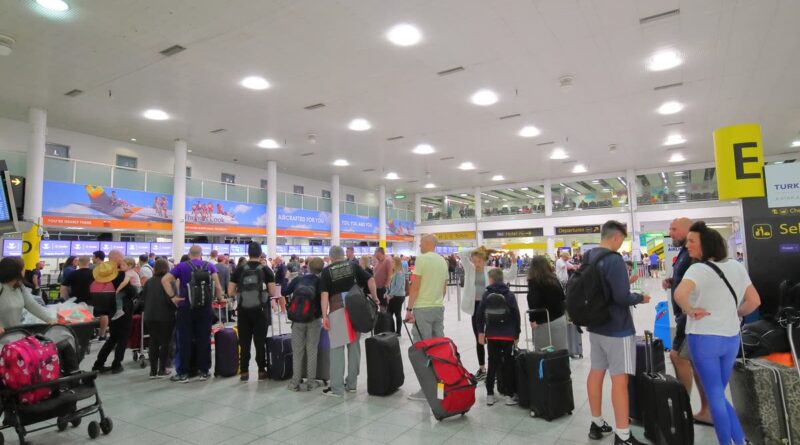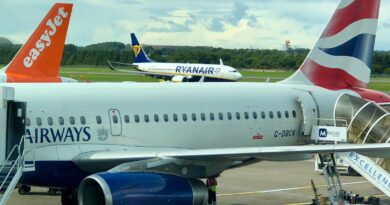Flight cancellations soar as peak season begins. What should we do about it?
Naples, Faro and Copenhagen were among the 20 fallers on Saturday morning. By the afternoon it was the turn of Bordeaux, Basel and others. These were among the easyJet flights cancelled at Gatwick on Saturday. By mid-afternoon, 34 arrivals and departures had been grounded by Britain’s biggest budget airline from its main base – representing about 6,000 passengers. The reason, according to easyJet: “Air traffic control restrictions across Europe as a result of thunderstorms and capacity restrictions causing disruption.”
Friday – which was set to be the busiest day in the skies of Europe since Covid – was even worse. On top of some overheated weather in central and southeastern Europe and a technical hitch at the key air traffic control centre in Maastricht, all arrivals and departures at Gatwick were suspended for 50 minutes over Friday lunchtime. The cause: a British Airways 777 whose pilots decided to reject their take-off to Vancouver.
As the plane sat in the middle of the runway with the airport fire service attending to the overheated brakes, diversions began at once at the world’s busiest single-runway airport. The Emirates arrival from Dubai disappeared to Brussels, while an inbound BA flight from Malaga diverted to Heathrow – where it stayed, due to passenger action. Stanley Johnson, the writer and father of a former prime minister, decided he wanted to leave rather than wait for refuelling and the planned onward flight to Gatwick.
British Airways and Wizz Air both cancelled a dozen flights, but easyJet’s Gatwick groundings dwarfed its rivals: 78, including some long hops to Cyprus, Turkey and the Canary Islands.
Who’d be an airline passenger? A week earlier, dozens of flights were diverted or cancelled at Gatwick Airport due to staff shortage in the air traffic control tower.
By Sunday morning, it was the turn of a power surge at Manchester airport to grab the headlines. For several hours, nothing could leave Terminals 1 and 2 – and soon incoming planes were being turned away. A few thousand passengers found themselves touching down unexpectedly at Gatwick, Heathrow, Birmingham or even Ostend in Belgium because the gates were all filled by delayed planes. Around 20,000 passengers found their flights to and from Manchester cancelled. Many of those who were lucky enough merely to be delayed landed at their destinations without their baggage. One cruise passenger, Derek Flint, was finally reunited with his luggage five days after he had flown from Manchester to Barcelona with Jet2, after the cases had been off on their own adventure.

My adventure this week looked scuppered before I had even reached Stansted Airport. At 4.30am on Tuesday morning, hundreds of passengers waiting at London Liverpool Street for the first Stansted Express learnt the train would not, in fact, reach the Essex airport due to overrunning engineering work. Instead we were told to hop off at Bishop’s Stortford and wait for the one behind. Anyone who actually took this advice would have arrived at Stansted 40 minutes late, quite possibly enough to put paid to travel plans.
Instead, lots of us sprinted for the taxi queue – where a mere £65 was charged for the 15-minute journey (I shared with five other desperate passengers). I walked into the terminal 45 minutes before my flight departed – with the added hurdle of a bike in a bag that I needed to check in. Self-check in and security could not have been smoother. I even had time to buy a coffee en route to gate 59 (so distant that I swear it is in Cambridgeshire) and start to plan how to respond if, as seemed likely, my bike didn’t make the plane. I need not have worried: on touchdown in Limoges, west-central France, it popped out promptly.
In contrast, thousands of British Airways passengers were separated from their baggage on Wednesday after BA’s allocation system failed.
On Thursday, it was the unfortunate turn of thousands of passengers at Bristol and Liverpool airport to find their flights cancelled.
We need to talk about summer.
The basic problem: little slack in the system. Understandably, the airlines schedule their flights on the basis that most things will go right. They have some backup, but keeping a plane, pilots and cabin crew on standby in peak season represents a large “opportunity cost”: with demand so strong, every July and August flight can make a mint.
Aircraft generate profits only when they are in the air. The trouble is, a lack of resilience reveals itself in massive disruption (and consequently enormous hotel bills for airlines). Either the authorities should stipulate a minimum level of backup, or we should get used to cancellations. I suspect it will be the latter. Just make sure you know your rights when it all goes wrong.




